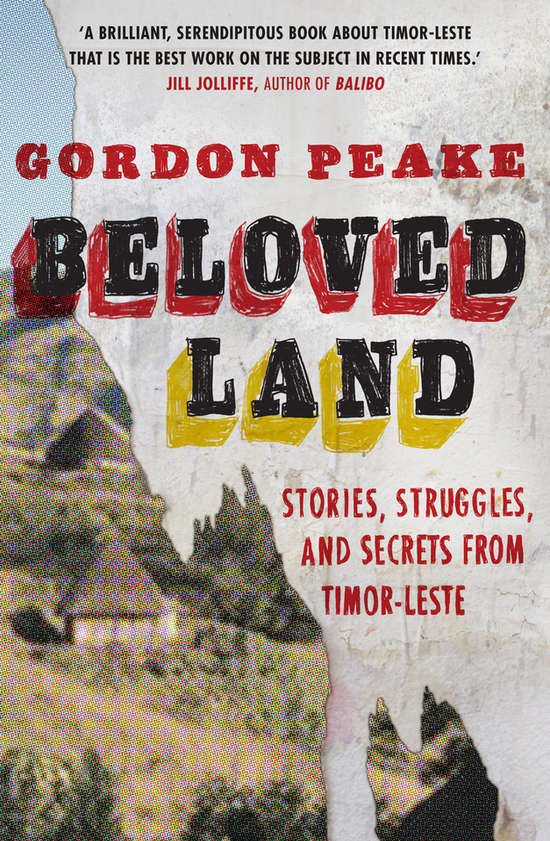Beloved Land: Stories, Struggles, And Secrets From Timor-Leste, by Gordon Peake. Scribe Publications, 2014. 256 pages, $ 13.19 (www.amazon.com)
“At the stroke of midnight on 20 May 2002, the Democratic Republic of Timor-Leste became the first new nation of the 21st century. From that moment, those who fought for independence have faced a challenge even bigger than shaking off Indonesian occupation: running a country of their own. Beloved Land picks up the story where world attention left off.”
In the book, Gordon Peake, a development specialist who was initially meant to spend only a few weeks in Dili and ended up staying for several years, tells a story about his time in Timor Leste, blending travelogue, history, and political analysis, providing a useful introduction to one of the least known countries in the world.
The author describes at length how Timorese politics is a complicated web of alliances, factions and family relationships that are very hard for outsiders to understand, yet his bafflement seems at times exaggerated – after all, isn’t that the way politics works not only in developing countries, but all over the world? Equally, his descriptions of local traditions and superstitions sometimes strike the reader as a bit Western-centric.
The book is more interesting when Peake describes how the aid and “peace industry” overruns the country, sending in supposed experts who produce long reports of little or no use to the local government. He describes overpaid development specialists who speak neither Portuguese, Tetum nor Indonesian, yet seem confident to help the nascent state on such intricate matters such as reforming the telecommunications sector. This points to larger questions about the international community’s capacity to help a struggling nation build a functioning state. Although Peake does not engage in this discussion, his book suggests international organizations still have a long way to go to play a constructive role.
This matters greatly because Timor-Leste was born at the height of global nation-building euphoria, when many international observers seemed confident about the UN’s capacity to rebuild failed or new states. James Traub’s article in Foreign Affairs in 2000 of Sergio Vieira de Mello in Timor Leste (“Inventing East Timor“) best symbolizes this moment.
He writes that
the U.N. is fully aware of East Timor’s importance as a test case and has sent out a kind of A-team of international technocrats. Most of the top people in UNTAET speak four or five languages, have extensive experience in Bosnia, Kosovo, Cambodia, and elsewhere, and seem appropriately daunted and bemused by the magnitude of the burden they have been handed.
A few months later, Ruth Wedgewood wrote a critical reply to Traub, arguing that
The U.N. Transitional Administration for East Timor (UNTAET) building overlooking the harbor in Dili is also chockablock with p-5s, d-1s, and d-2s — expensive senior staff — who happen to lack any experience in providing basic government services.
She further writes that
Traub says that the U.N. is “fully aware of East Timor’s importance as a test case and has sent out a kind of A-team of international technocrats” who “speak four or five languages.” Right idea, wrong languages. Only a handful of U.N. staff speak Bahasa Indonesia (a Malay tongue) or Tetun, preventing them from communicating with 80 percent of East Timor’s population.
Beyond the question of nation-building, Beloved Land is insightful when it describes the processes by which opposing parties during the struggle for independence made peace and today seem to go hold no grudges against each other, despite the human rights abuses committed. Peake finds the Timorese capacity to forgive and move on strange, and indeed it is nothing short of admirable and deeply pragmatic, for post-conflict societies are often too fragile to punish the guilty, as the perpetrators of violence are still too powerful and important to participate in the state-building process. In the same way, Timor Leste’s visionary leader Ramos-Horta once remarked that his country had no interest in asking Indonesia to punish those involved in the 1999 mass killings in Timor Leste, for it could undermine Indonesian democracy, where former military leaders still hold considerable political power.
Peake’s account is personal and his relaxed and self-deprecating style make Beloved Land an enjoyable read for those interested in Timor-Leste. In several instances, his editor could have done a better job reducing repetitiveness (for example, the reader learns several times about an episode during which a group of journalists was “killed in cold blood”), and in some passages could be shortened somewhat to improve the flow. Still, given the book’s informal nature, these few flaws do not matter much, and the author achieves his main objective – to provide a vivid glimpse into the soul of one of the world’s youngest nations and the challenges it faces.
Is Indonesia a Rising Power to be Reckoned With?
Book review: “How To Get Filthy Rich in Rising Asia” by Mohsin Hamid









